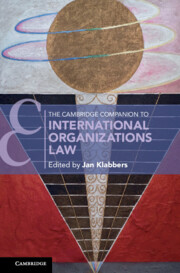Book contents
- The Cambridge Companion to International Organizations Law
- Cambridge Companions to Law
- The Cambridge Companion to International Organizations Law
- Copyright page
- Contents
- Contributors
- Acknowledgements
- Cases
- Introduction
- 1 Beyond Functionalism
- 2 The Concept of International Organization
- 3 Accountability
- 4 Inclusion and Exclusion in International Organizations
- 5 A Legal Framework on Internal Matters
- 6 Standard-Setting in UN System Organizations
- 7 Operational Activities
- 8 Deliberation
- 9 Teaching Statehood
- 10 Interaction between International Organizations
- 11 The International Organization for Migration and the Duty to Protect Migrants
- 12 Global Health
- 13 Energy Provision
- 14 International Organizations, Disarmament and State Behaviour
- 15 International Organizations and Stories of Development
- 16 Food Security and International Organizations
- 17 Financial Stability
- Epilogue
- Bibliography
- Index
8 - Deliberation
Published online by Cambridge University Press: 31 March 2022
- The Cambridge Companion to International Organizations Law
- Cambridge Companions to Law
- The Cambridge Companion to International Organizations Law
- Copyright page
- Contents
- Contributors
- Acknowledgements
- Cases
- Introduction
- 1 Beyond Functionalism
- 2 The Concept of International Organization
- 3 Accountability
- 4 Inclusion and Exclusion in International Organizations
- 5 A Legal Framework on Internal Matters
- 6 Standard-Setting in UN System Organizations
- 7 Operational Activities
- 8 Deliberation
- 9 Teaching Statehood
- 10 Interaction between International Organizations
- 11 The International Organization for Migration and the Duty to Protect Migrants
- 12 Global Health
- 13 Energy Provision
- 14 International Organizations, Disarmament and State Behaviour
- 15 International Organizations and Stories of Development
- 16 Food Security and International Organizations
- 17 Financial Stability
- Epilogue
- Bibliography
- Index
Summary
International organizations (IOs) are sometimes derided as ‘mere’ talk-shops. This is unfair for two reasons. The first and most obvious is that international organizations do more than serve as venues for government representatives to speak to (or at) one another – they act. The European Union and, to a lesser extent, other organizations have governing powers. The United Nations, African Union and NATO conduct peace operations. The World Bank and regional development banks finance development projects. The Office of the UN High Commissioner for Refugees and multiple humanitarian organizations run refugee camps and massive aid programmes.
- Type
- Chapter
- Information
- The Cambridge Companion to International Organizations Law , pp. 173 - 198Publisher: Cambridge University PressPrint publication year: 2022
- 1
- Cited by

